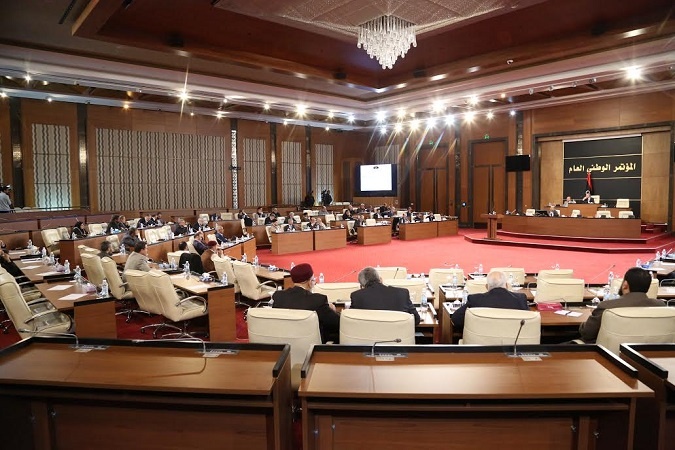The Finance Minister in the National Salvation Government, Younis Al-Burasi, said his ministry is currently preparing the 2016 budget amid a very bad economic situation, high prices, financial corruption and deficit in covering the budget items, let alone the crippling crisis in the oil markets and political division in the country.
The minister’s declaration came in a session held last week in the General National Congress headquarters in the presence of Heads of Finance Ministry departments, the Director of Economic Development Fund and the Head of the Information and Documentation Center.
Minister Al-Burasi added that despite the dire situations that are toppling country, he has always been optimistic that the financial situation is not too bad, pointing out that he remained in contact with the concerned departments such as the Central Bank of Libya (CBL) and the Audit Bureau to help overcome the present situation and make sure the public institutions operate almost normally.
“Regarding the LYD4 billion budget surplus from 2015, we can attribute that to the application of the national ID number project, as we had a total of (2,266,226) national ID numbers from state employees, from public companies and students, out of which only (1,889,087) ones matched, while the rest were excluded fore duality.” He explained.
He also pointed to the inflation in the public sector work force, giving the example of the education sector, which includes more than half a million employees constituting a third of the state employees. Consequently, the education sector thus has represented a burden on the public budget and duly necessitated reviewing and reconstructing the sector to be able to transfer the non-specialized employees to other suitable sectors.
Moreover, Minister Al-Burasi informed the GNC that the loans and deposits in the foreign countries are classified into three categories, good loans, problematic loans, and others with delayed payment.
“The amounts of the recovered Libyan loans from other countries reached ($82,693,000 and 9,894,000 euros) from Tunisia, Madagascar, Mauritania, Nicaragua, Mali and Serbia. While the loans which are still due payment are worth a million dollars given to Sudan and another one million dollars to Tunisia.” He elaborated.
Al-Burasi also clarified that there is still a deposit of $2 billion at the Central Bank of Egypt, which is not yet to be paid up and explained that the debts and interests to be paid for Libya from twelve African countries reached ($1,700,000,000). He pointed out that the payment of those debts was delayed despite rescheduling new paying periods and frequent requests for settlement.
The GNC assembly session did not suggest any specified sum for the 2016 budget, but the Finance Ministry reviewed the amounts estimated and liquidized for the budgets of the fiscal years 2013/2014/2015 and concluded that the amount of money estimated for medicines in 2013 was LYD840 million, out of which (LYD355,599,000) was liquidized,
On the other hand, an amount of LYD700 million was allocated for medicines in 2014 yet a sum of (LYD641, 666, 667) was cashed out, whereas, in 2015, the amount was LYD977 million and just LYD550 million was cashed.
In addition, the Minister stated that the Children’s allowance for 2015 was estimated at (LYD1, 040 billion) out of which nothing was cashed out and the fuel subsidy was estimated at (LYD6.5 million) out of which (LYD6.14 million) was liquidized. While in 2013 and 2014, the electrical power subsidy reached (LYD900 million) and (LYD800million) consecutively all of which was liquidized, and in 2015, the electrical subsidy was (LYD900 million) out of which (LYD852 million) was liquidized.
Moreover, Al-Burasi said, in 2014, the ministry data showed that subsidies for the farmers and animal and poultry breeders in the form of urea fertilizers and fodder subsidy amounted to (LYD37,750,000) out of which a sum of (LYD35,166,667) was liquidized but the ministry did not release any data about this item for the year 2015. Besides, the Ministry data further showed that an amount of (LYD40 million) was cashed to the Crisis Committee while (LYD174, 797,335) was spent on treatment for the sick and the wounded of the war.
As for the money liquidized as part of the third chapter, the Minister clarified that the total of the distributed amounts was (LYD 3.14 billion) given as follows:
- (LYD700million) for the postgraduate studies abroad.
- (LYD741million) for the electricity company.
- (LYD860.3million) for the National Oil Corporation.
- (LYD73.8milion) for the work force.
- (LYD764.4million) for the projects.
On the other hand, the Director of Economic Development Fund reviewed the problems faced by the Fund in paying the sums allocated for the investment portfolios’ holders. He explained that an amount of (LYD13 billion) has been cashed out for 32 companies provided that they pay the 235 thousand portfolios’ holders directly from the profits. However, the profits were in fact not achieved, yet a sum of (LYD 7 billion) was paid from the capital.
As a result, those companies were either of low profitability or of virtually non-existent profit and thus the solution lies in the re-evaluation of portfolios’ holders in terms of ability to find work occupations for the capable ones among them, and refer some of them to the Social Security, whereas look for solutions to the rest of them.

